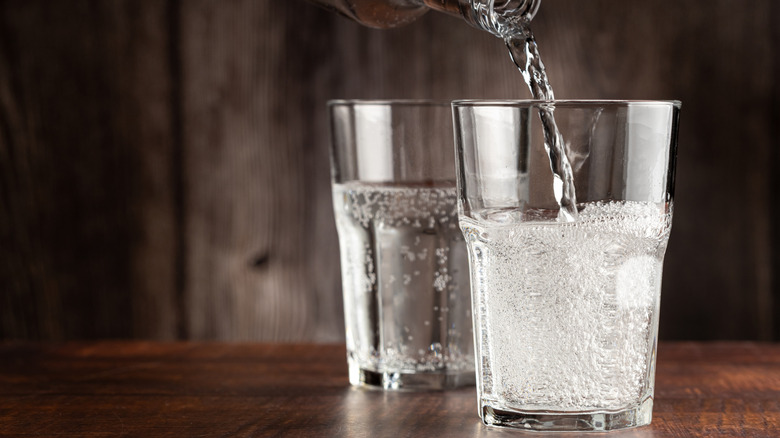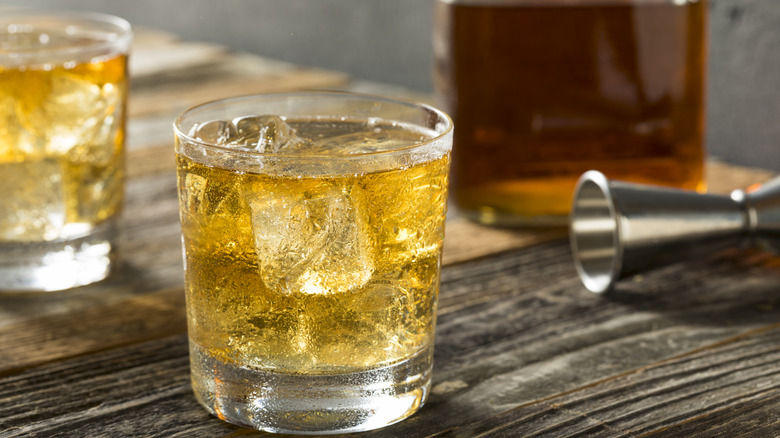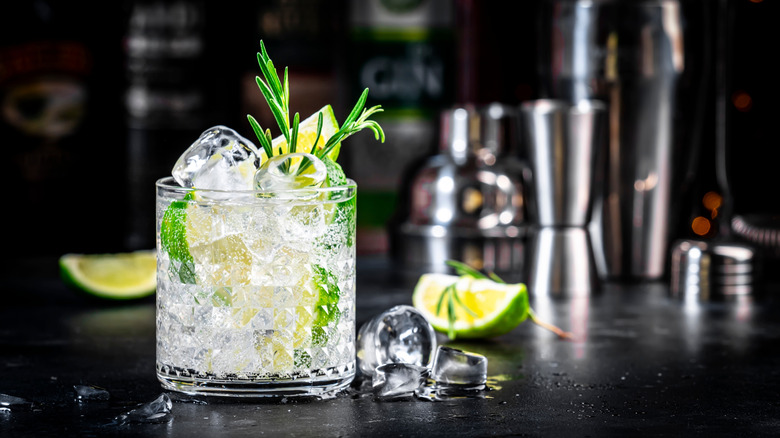Are Club Soda & Tonic Water The Same Thing? When To Use Each
Gin and tonic was the first alcoholic drink I ever had. I immediately fell in love with the herbal notes of the gin balanced by the slightly bitter, slightly sweet hallmark of the tonic water. With the perfect proportions of gin and tonic, it's a hard drink to mess up – two ingredients and a slice of your chosen citrus. however, one night, a bartender messed up, causing me to nearly spit out my drink. He had put club soda in rather than tonic water. The result was an eye-opener, to say the least.
There's a reason why different drinks call for different mixers: the non-alcoholic ingredients are often added to contribute flavor and volume to your cocktail. Club soda and tonic water are two of the most popular, but they are vastly different and will alter the profile of your drink, sometimes shockingly so, as with my gin and club soda episode.
Both of these mixers are carbonated, water-based products, but that's where the similarities end. Club soda is simply carbonated water with various minerals added; these minerals can differ from product to product, slightly changing the character of each brand. The essential differentiator in tonic water is quinine, which is sourced from the bark of the Cinchona tree native to the Andes. Where club soda has a relatively neutral character, tonic water is unmistakable due to its pungent flavor, which is also sweetened to counter the bitterness. In a pinch, you can substitute club soda for tonic, but the result will, of course, be different.
The minerality of club soda
Club soda tends to be used when you want a mixer that lightens up a drink and adds some zip, thanks to the addition of the bubbles. Bartenders often turn to it because of its mineral content and fizz accent, but it doesn't compete with the flavors in many drinks, including the vodka soda, Scotch and soda, and the Aperol spritz. Compared to the unmistakable notes in tonic water, club soda is quite gentle.
The major minerals in club soda can include varying amounts of additives like potassium sulfate, sodium bicarbonate (baking soda), and potassium sulfate. These are what lend a bit of a salty quality, as well as the fine bubbles. Different manufacturers choose different mineral levels, combinations of minerals, and various carbonation intensities, so you should test out several to find which one you enjoy most. The same goes for tonic water, whose carbonation, quinine intensity, and amount of sugar change depend on the producer's predilection.
Despite these defining specifics, club soda is often confused with other types of carbonated water like seltzer and sparkling water. Of all the bubbly varieties of water, seltzer is the most neutral as it is literally just carbonated water. Sparkling water may or may not also be mineral water, which is naturally sourced and has trace minerals that affect the flavor. Just like switching out tonic water and club soda, you could do the same with these other waters, again with unique results.
The bitter character of tonic water
Tonic water is defined by quinine. You simply cannot have one without the other. Historically, the Quechua, an indigenous people of Peru and Bolivia, used ground cinchona bark in tea to cure fevers. Jesuit missionaries brought the bark back to Europe, and the alkaloid quinine was successfully extracted from the bark in 1820. It soon became recognized as the de facto malaria prophylactic in the nineteenth century.
While quinine is toxic in large amounts, small amounts not only save lives but add that distinctive, bitter tang to many cocktails, particularly those that are gin-based. During the British occupation of India, cinchona bark powder was distributed to British soldiers. To disguise the harsh taste of the medicine, they combined it with sugar and water, adding it to their daily ration of gin to create a makeshift gin and tonic. One of the most iconic drinks was a happy accident born of practicality.
Once bottled tonic water was invented, the quinine was offset with sugar, the bittersweet combination naturally complementing the softer notes of light spirits. Gin's vibrant, herbaceous botanicals intertwine with the tonic's sharp and slightly citrusy profile. Likewise, vodka is a natural base for tonic water, as seen in the vodka tonic.
Both tonic water and club soda have their merits, but there's a reason they tend to find their way into different cocktails. If your drink needs a muscular — and distinct — punch, opt for tonic water. A hint of savory saltiness calls for club soda.



